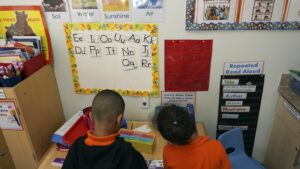In an era where teenage reading habits are evolving, a high school book club in Portland, Oregon finds romance novels striking a chord with its members. These young readers are immersing themselves in tales of love, defying the broader trend of declining recreational reading among teens.
According to a federal survey, the number of 13-year-olds reading for leisure has decreased significantly over the past decade. However, at Lincoln High School in Portland, the romance book club defies this trend, with students passionately engaging in romantic literature. NPR’s Sequoia Carrillo reports on this unique reading phenomenon.
One avid reader, Rose Sandell, is so engrossed in romance novels that her mother often reminds her to stay hydrated. “This week by itself, I’ve read, like, five,” she admits, even if it means falling behind on her U.S. history assignments. Rose, a freshman and a leader of the club, shares her love for romantic comedies and mafia romances, delighting in the happy endings they promise.
These novels come in various forms, from steamy to chaste, featuring diverse characters who navigate disabilities, identities, and sexual orientations. Rose describes the joy these stories bring her, saying, “I just love how happy it makes me feel and how bubbly. And I love how, like, characters get their happy endings. It’s just so magical.”
The popularity of romance novels is reflected in their sales, which surged by over 50% in 2022, according to Publishers Weekly. This rise is partly attributed to young readers like Rose and her club peers, who see romance books not as guilty pleasures but as enjoyable reads. Lola Kovel, a past club leader, notes the stigma around the genre, highlighting prejudices against female authors and female pleasure.
When asked what they seek in romance stories, club members revealed their preferences. “I’m a big enemies to lovers girl,” says Lola, while others enjoy themes like childhood friends to lovers or mysteries to solve together. For students like Camilla Correani, a hint of Taylor Swift or a picturesque setting is irresistible.
Both Camilla and Lola, now graduates, continue to follow the club’s monthly book selections online. The chosen books must be approved by school librarian Lori Lieberman, who is keen to maintain her role by steering discussions away from explicit content. “We read books that have sex in them, but we don’t really talk about the sexy parts, mostly because I really like my job, and I like to keep it,” Lieberman quips.
Instead, the club focuses on the narrative elements like meet-cutes, chemistry, and the inevitable reunions Rose cherishes: “They always end up together, because love is the greatest superpower in the world.”
In contrast to the national rise in book bans, Lincoln High enjoys strong support from its administration and parents. Rose’s father, Graeme Sandell, trusts the club’s ability to tackle mature themes, recognizing romance novels as a reflection of diverse life experiences.
Lori Lieberman mentions the club’s self-funded approach, which encourages responsible discussion among students. Former leader Camilla Correani emphasizes the importance of critically examining romance and other genres for harmful stereotypes.
The club has engaged in meaningful conversations about race, gender, and consent, even discussing a controversial scene in Julia Quinn’s “Bridgerton” series with the author herself. Student Ruby Berman believes these discussions highlight romance’s capacity to teach that love and relationships are diverse and complex. “I think romance can really teach you, like, there’s no right way to love someone and there’s no one right way to have a relationship,” she reflects.





